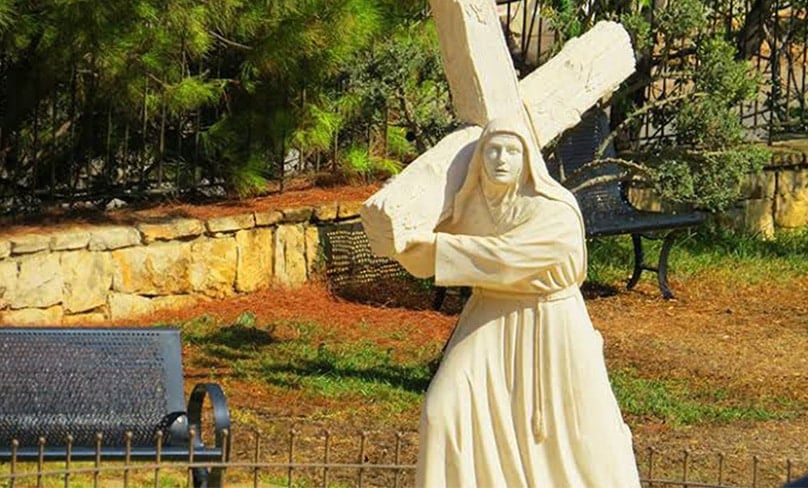
By Joseph Wehbe
Whenever we reflect on the Cross, the first thought that comes to mind is that of suffering.
Heavy, burdensome and impossible are words that sum up how we often describe the “crosses” we carry, and the Cross that Our Lord Jesus carried.
St Rafqa El–Rayes, one of the great 19th Century saints of the Maronite Catholic Church, was a Lebanese Maronite nun who – through the holiness that flowed from her – knew too well that the Cross was heavy, burdensome and humanly impossible to endure.
Yet she believed that if she did not participate in the call of the Cross she would be unfaithful to her spouse ‘the Cross bearer’, Our Lord Jesus.
On the Feast of the Holy Rosary in 1885, St Rafqa made a vow to her most precious Jesus to participate in the redemptive sacrifice of the Cross, just as Our Blessed Mother Mary did when she stood at the foot of the Cross. Would we be prepared to do the same?
It would be most appropriate then to consider St Rafqa as the ‘Lover of the Cross’:
“What made Rafqa love the Cross? … She could not find any other way but the Cross as a means of fulfilling the deepest desire of her heart to love God … She knew that the Cross in the life of a human person is not a choice or an act of the will but is a truth that is imprinted in the depth of the human psyche …” (Saint Rafqa, the Lebanese Maronite Nun, by Elias Hanna)
Yet the Cross does not only imply suffering, it also conveys a message of victory and glory.
As St Paul says in his first letter to the Corinthians, “The message about the Cross is foolishness to those who are perishing, but to us who are being saved it is the power of God.” (1 Corinthians 1:18)
As we continue to journey through the liturgical year in the Maronite Liturgical Calendar, we are now in the season of the Exaltation of the Glorious Cross.
In this season an emphasis is placed on the glorious and victorious natures of the Cross.
For the suffering endured by carrying the Cross of sin, shame and illness, will one day be the cause of our joy, glory and victory.
This was the secret of St Rafqa’s victory over the many sufferings she endured in her life, including severe headaches, the loss of an eye and her vision.
Her doctors thought that what she was experiencing was humanly impossible to bear due to the pain her illnesses caused.
She embraced her Cross with a smile as she knew that it would be the bridge that would allow her to cross over from this earthly life to the everlasting life, which her heavenly Bridegroom was preparing for her.
This can also be our secret, a silent weapon against the deception of Satan. The evil one so often discourages us from understanding the beauty that emanates from what was once a symbol of shame, humiliation and weakness.
The Cross is a school of God’s love, a message of hope and forgiveness, a magnetic force that draws all people to the Saviour of the world and lover of all people. It is the tree of life, a sacred wood that blesses and heals, a throne of glory and victory. It is our saving grace.
“Blessed are you, O Holy Cross, you are the sign of freedom and the banner of victory!”
These words are prayed in the prayer of forgiveness or Hosoyo in the Maronite Divine Liturgy for the Feast of the Exaltation of the Glorious Cross.
An amazing insight is given to us here of the mystery of the Cross. The Cross is a sign of freedom that stems from an endurance of suffering and a true surrender of ourselves and the earthy treasures we hold on to.
It is also the banner of victory we are called to carry, embrace and share, for it gives life to those who believe in the power that radiates from the One who bore it for our sake.
How can one fathom the Cross in all its glory! When the Cross is gazed upon, love is the message, and this message is not to be kept for ourselves. It is the answer the world needs today.
As Christians we are called to take this message into our homes, workplaces, communities, parishes and – most importantly – into our own hearts. It is the strength we need to persevere, our gain in times of loss, a gift that is freely given to us from God. The Cross may not be what we want, but it is what we need!
“O Sister Rafqa, you walked with Jesus
And carried daily your cross with courage”
(From the Qolo, chanted after the Hosoyo during the Maronite Divine Liturgy on the Feast of St Rafqa, 23 March).
Teach us, dear sister, also to do the same. St Rafqa, Lover of the Cross, pray for us.
Joseph Wehbe is currently completing a Master of Arts (Chaplaincy Studies) at UNDA. He is Youth Advisor and Choir Leader at St Raymond’s Maronite Parish in Sydney.
